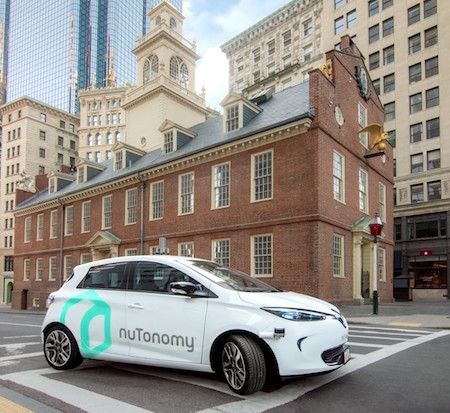These tests come after a period of testing in Singapore and will look to build upon the knowledge gained from those road tests, even comparing different countries’ patterns of behaviour. nuTonomy intends to launch its self-driving mobility-on-demand service in Singapore in 2018. nuTonomy also recently forged a partnership with Grab, a ride-hailing app, to support the expansion of nuTonomy’s ongoing public trial of self-driving cars in Singapore. The trial is giving select Grab users a chance to experience the full end-to-end experience of e-hailing and riding in a nuTonomy self-driving vehicle in and around Singapore’s one-north business district.
With one of the founders hailing from MIT, it’s no wonder that they’ve chosen Boston as a testing ground. Robotics Law journal talked with a spokesperson for the company.
nuTonomy System: What Makes it Unique?
The nuTonomy system enables autonomous vehicle navigation in the most challenging urban environments, smartphone-based ride hailing, fleet routing and management, and controlling a vehicle remotely through teleoperation.
Our vehicles are outfitted with a range of vision, LIDAR, and RADAR sensors, as well as cameras. Our combination of state-of-the-art sensors and algorithms is able to monitor and react to all situations presented by other vehicles, pedestrians, cyclists, and other road users. We have built our software specifically to navigate the entire range of unpredictable scenarios that may occur on the road.
A key differentiator is the fact that the company’s heritage is robotics, not traditional automotive production. nuTonomy is pioneering technology for motion planning and decision-making in its software system that is based on methods that have been used successfully in the development of spacecraft, airplanes, and other complex, safety-critical autonomous systems. Formal logic, which is used in spacecraft, enables nuTonomy’s vehicles to be more reliable and robust in their features, as well as drive in a more “human” way.
What Specific Data Do You Hope to Gain From Testing in Boston?
Driving in Boston will enable our autonomous vehicles to acquire a range of valuable data and experience as they learn local signage and road markings. Moreover, we will gain a deeper understanding of pedestrian, cyclist, and driver behaviour and interaction across a complex urban driving environment that features greater traffic density and older infrastructure than in Singapore.
The complexity of driving in Boston is somewhat higher than in Singapore, and we will adjust our software accordingly as the tests are conducted and we gain experience in local traffic and weather conditions.
Testing Phase
We hope to test as long as we continue to gather valuable feedback, and will work with officials in Boston to expand the size of the test bed in the future.
Learning in different countries, cultures and infrastructures is a competitive advantage, and we hope to test in several different urban settings as long as we continue to gather valuable feedback.
For nuTonomy it already is [a norm to test in multiple countries], as we’ve also been testing on closed tracks in the U.S. We aim to be a global provider of autonomous mobility-on-demand services.
Our confidence in the safe performance of our system had grown to a point last summer that we were comfortable enough to launch public trials on public roads in Singapore. We are in talks with other jurisdictions to expand in the future.
How Has the Testing in Singapore Informed Your strategy?
Our ongoing public trials in Singapore continue to provide us with valuable feedback from riders on the entire experience – from booking to arriving at the final destination. Reactions from riders so far have been very positive. People begin the rides hesitant or excited, but seem to quickly accept the fact that the car drives like they or any other driver would, and the anxiety dissipates. We’ve also seen passengers humanize the car by giving it a name or comparing its driving to people they know. We’re utilising this feedback and information to improve the comfort, performance, and safety of the nuTonomy fleet, as we work toward the commercial launch of our on-demand self-driving car service in Singapore in 2018.


.jpg)
.jpg)
.jpg)

.jpg)




.jpg)